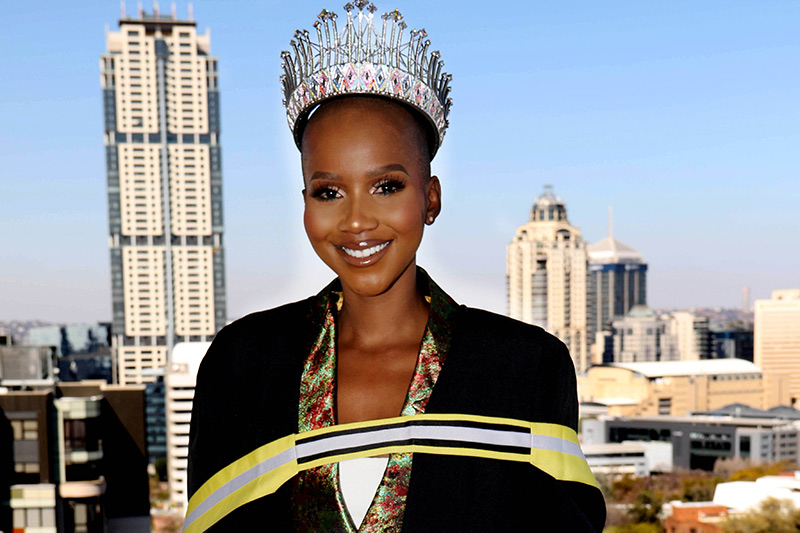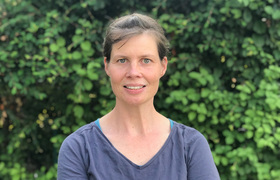Shudufhadzo Musida: Change the discourse on mental health disorders
11 August 2021 | Story Niémah Davids. Read time 7 min.
Empowering the mind of a girl child using education as the tool will help to build a society of empowered women who will pay it forward, break harmful cycles, and rebuild new and improved pathways to achieve holistic health and well-being, said Miss South Africa 2020 Shudufhadzo Musida.
Musida delivered these and other powerful comments during her keynote address at the University of Cape Town’s (UCT) annual Women’s Day event. The celebration was hosted by UCT Vice‑Chancellor Professor Mamokgethi Phakeng, and was held online on Tuesday, 10 August. The afternoon’s festivities made for a packed programme, including a musical performance by the Lady Day Big Band, featuring UCT alumna Lana Crowster and the UCT Centre for Theatre, Dance & Performance Studies.
In keeping with tradition, the event also featured UCT’s For Womxn By Womxn research grant recipients. The grants were awarded to postgraduate students and postdoctoral fellows, and place special emphasis on capacity building among black South African women and transgender researchers. Grant recipients Dr Katye Altieri, Professor Janet Hapgood and Dr Robin Pickering provided brief updates on the status of their research projects, which focus on developing women in the field of oceanography, contraception and HIV risk for women in sub‑Saharan Africa, and transforming the field of palaeoanthropology respectively. Their updates also included presentations by their students.
“For any change to come about in our society, we need to empower the mind.”
“I call the mind the powerhouse; the tool that can change lives and the narratives that exist in our society. For any change to come about in our society, we need to empower the mind. If we do not, we will live in a society that has low levels of self‑awareness,” said Musida.
Education is the key to change
For Musida, being crowned Miss South Africa is “much more” than being acknowledged as a beautiful, healthy woman who can act as a role model for other young South Africans. Instead, she said, she is grateful for the platform her reign provides – one that allows her voice to be amplified and heard on crucial matters such as mental well-being.
“I [had] personal experiences struggling with mental health [challenges]. I know for sure that anyone, irrespective of their standing or where they come from, can [have similar challenges]. It doesn’t discriminate,” she said.
“Given my experiences, I use the platform I have as Miss South Africa to shift attitudes and to remove the stigma attached to mental illnesses. I have made it my mission to promote mental health.”

Growing up in Limpopo, Musida said, conversations about mental health challenges were considered taboo; and people struggling with mental health disorders were often tormented, vilified and embarrassed.
But thanks to her grandparents (despite their not having attained a high level of education), Musida learnt about mental health disorders and the importance of education, particularly in addressing inequalities.
“Education empowered me by giving me the precious gift of critical thinking. Through education, we debunk the unequal gender power dynamics and harmful gender norms that hinder empowerment,” she said.
“Education is the key to the economic autonomy of adolescent girls and women, and the key to change.”
No health without mental health
Musida said it has been a “revelation” that the world has finally started to openly address mental health disorders and their effects. After all, she added, holistic health does not exist without mental health.
And she’s played her part in the process. When she first entered the Miss South Africa pageant, she promised herself that if she was crowned, she would dedicate her reign to raising awareness and starting conversations about mental health. And she’s kept her word. Since being crowned, Musida has been hosting a series of Instagram Live Sessions known as Mindful Mondays, and discusses issues concerning mental health challenges. Every week she invites a different frontline mental health professional to contribute to the discussion.
“My fervent hope is that by telling my story, I’ve made it possible for young people who are being bullied to tell theirs.”
She said that not a single topic is off limits, and discussions have already covered everything from bipolar disorder to anxiety, depression and teenage suicides. Musida has also authored her first book, titled Shudu Finds her Magic, which focuses on how she was bullied as a child and is published in six of South Africa’s official languages. The foreword was written by Professor Phakeng.
“My fervent hope is that by telling my story, I’ve made it possible for young people who are being bullied to tell theirs,” said Musida.
Achieving gender equality
Achieving gender equality is impossible if society fails to change the narratives that exist around women and mental health.
“It’s time for us to stop using phrases such as ‘hysterical’, or ‘emotional’ or ‘neurotic’ when describing women. Unless the use of such language is changed, women will always be seen as shrill and out of control when compared to men,” she said.
According to Musida, becoming a game‑changer and thought leader in society requires balance, and good physical and mental health.
“What we all need is the ability to open up about what negative thoughts we are feeling. That doesn’t make us weaker; it makes us stronger,” she said.
Thank you
In her closing remarks, UCT’s executive director for research Dr Linda Mtwisha thanked Musida for her address on such a pertinent issue as mental health.
“You set a strong example, especially with the younger generation, by advocating for mental health, amplifying women’s voices and stressing the importance of education. Thank you for sharing with the country your special brand of discipline, determination and courage,” said Dr Mtwisha.
Mtwisha acknowledged the For Womxn By Womxn grant recipients and their students for their commitment to the academic project and to the transformation of science, research and academia. She thanked them for striving and constantly leveraging the transformative power of research to ensure that they respond to some of society’s greatest challenges.
“You pull us forward and encourage us to participate and grow.”
She also commended the vice-chancellor for her visionary leadership, which is characterised by a willingness to empower those around her.
“You pull us forward and encourage us to participate and grow. Thank you for facilitating and intentionally creating these much-needed spaces to engage educated empowerers,” she said.
 This work is licensed under a Creative Commons Attribution-NoDerivatives 4.0 International License.
This work is licensed under a Creative Commons Attribution-NoDerivatives 4.0 International License.
Please view the republishing articles page for more information.










